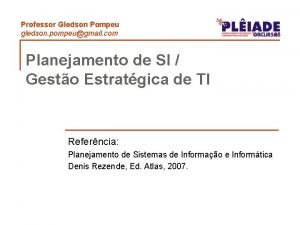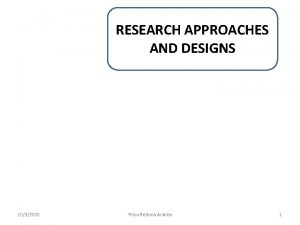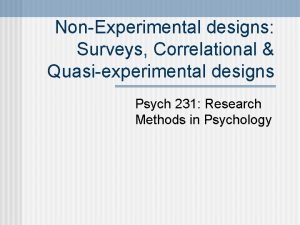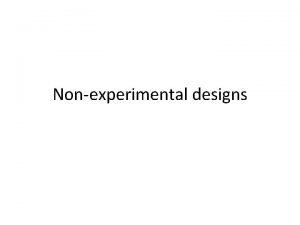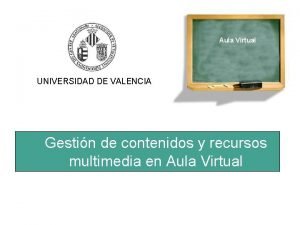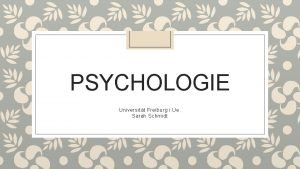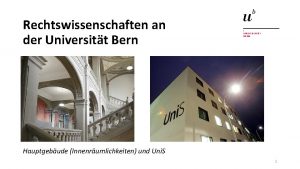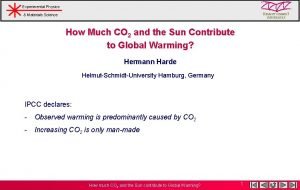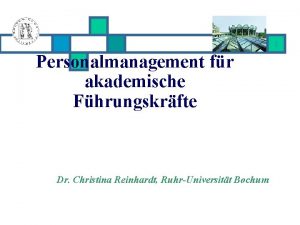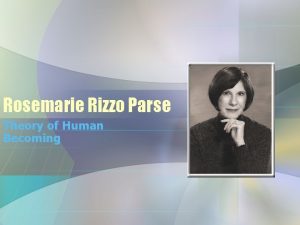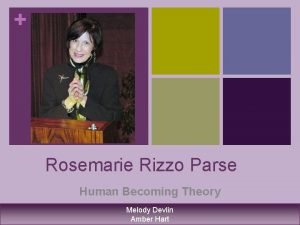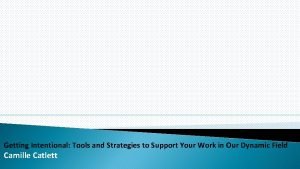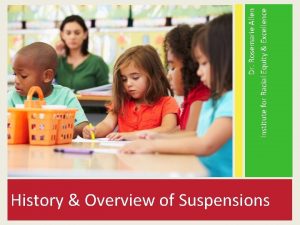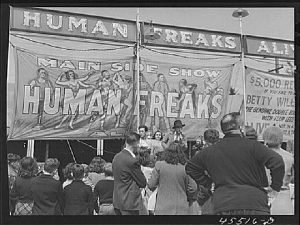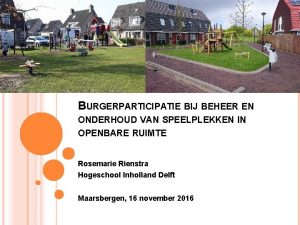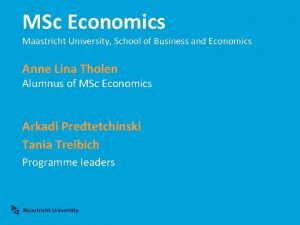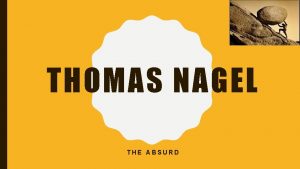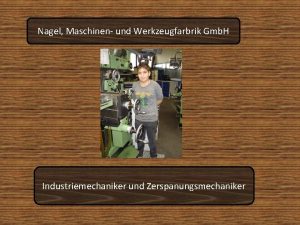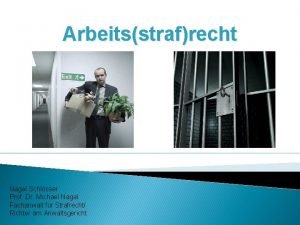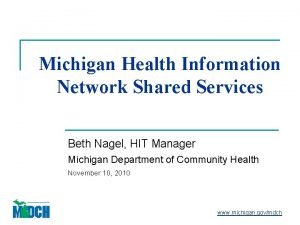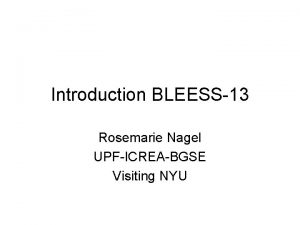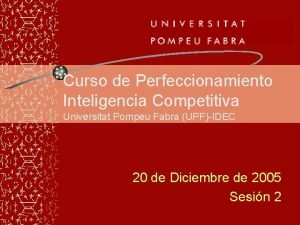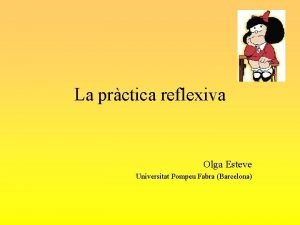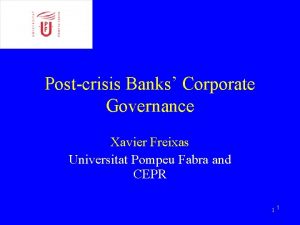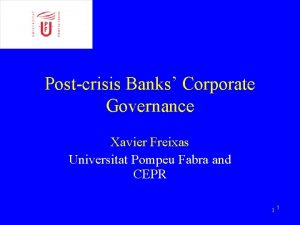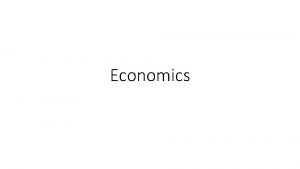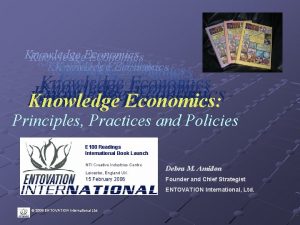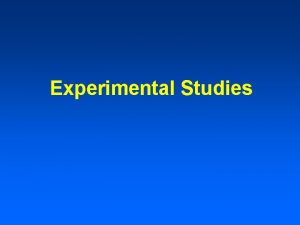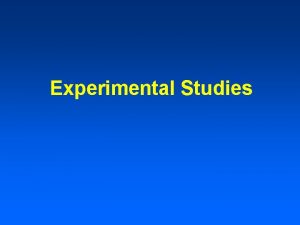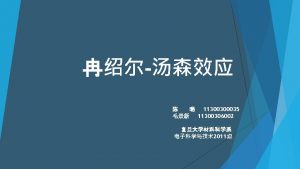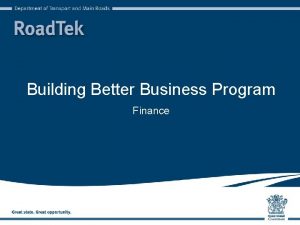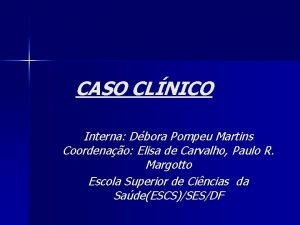Introduction to experimental economics Rosemarie Nagel Universitat Pompeu




























- Slides: 28

Introduction to experimental economics Rosemarie Nagel Universitat Pompeu Fabra, ICREA, BGSE April 2012

Course content (in red: replication of experiment) Week 1 • Introduction • guessing game Week 2 • Bargaining/public goods • Auctions Week 3 • No classes, individual office hours to discuss projects Week 4 • Discrimination, Gender • Neuroeconomics Week 5 • Learning • Individual decision making Week 6 • Market design • Macro experiments Week 7: • Field Experiments • Happiness/ethics Week 8 + 9 • own experiments Week 10 • Presentations of results and discussion. • No Class on Thursday – either long Tuesday or Tuesday & Wednesday

Instructor Christiane Schwieren (christiane. schwieren@gmail. com) • Office hour: by appointment • Office: 20 -206, Jaume I

What a class of experimental economics can offer …. explained with four quotes. . .

Konfuzius (孔夫子 ) 551 b. C. - 479 b. C. • "By three methods we may learn wisdom: First, by reflection, which is noblest; Second, by imitation, which is easiest; and third by experience, which is the bitterest. ” • "Tell me, and I will forget. Show me, and I may remember. Involve me, and I will understand. "

Theodore Bergstrom and John H. Miller “Taking a course in experimental economics is a little like going to dinner at a cannibal's house. Sometimes you will be the dinner, sometimes you will be part of the dinner, sometimes both” Quote from “Experiments with Economic Principles”

Albert Einstein The formulation of a problem is often more essential than its solution which may be merely a matter of mathematical or experimental skill. To raise new questions, new possibilities, to regard old questions from a new angle, requires creative imagination and marks real advance in science. ” Einstein and Infeld, p. 92, The evolution of Physics, (1938)

What you can expect from this course • The course is different from many courses in economics and business • It is a combination of – – Getting a series of experimental (lab-field) papers for single research questions Getting experience about people’s behavior through participation, running experiments Discussing/finding interesting (economic) problems and developing a research project from the first stage to the last stage, applying theory knowledge (game theory, micro macro, business, psychological theories) There is typically no clear right or wrong answer to a given problem but instead some heterogeneity what can be an answer. • You will hear about and discuss experiments • You will replicate experiments • You will need to find your own research topic – – which you develop from the beginning to the end producing a paper similar to a research paper but in a pilot stage (=some data, light analysis, introduction, conclusion)

Experimental Economics: Class Organization § In the first part of the class you will hear and discuss about series of experiments in different areas § § § to understand how economic questions can lead to an experiment, to understand how one experiment leads to new questions and new experiments. to understand important issues of experimental methodology § At the same time you will learn how to design an experiment by replicating existing experiments § § § as a subject as an experimenter to “experience” the methodological issues talked about § In the second part of the class § you will develop, design, run, and analyze your own experiment. § You will participate in and discuss the other experiments in the class.

Tasks • Read literature (see reading list + addit. Literature you find yourself) • Homework assignments of one page • Replication of experiments – In groups, in class – send instructions one day in advance to all students! • Develop, run and analyze your own experiment, – Discuss your fellow student work – At the end: term paper (no replication!)

Grading & Timing • The grade will be based on – class participation, performance as experimenter, presentations (together 20%), – and final paper (80%). • Timing – start now to find a topic – send me short outline (can be changed) before week 3 of the class – come to my office in week 3 (with appointment!)

Sources for experimental economics • Books and surveys (experimental economics-behavioral surveys): – – – – • Other sources – – – • Collection of experimental facts: Davis&Holt (1992), Kagel & Roth (1995) Experimental methods: Friedman & Sunder (1994), Bradsley et al. (2010) Facts and models: Camerer (2003), Behavioral economics: Camerer & Loewenstein (2005); Field experiments: Harrison and List (JEL, 2005) Neuro economics: Camerer, Loewenstein, and Prelec (JEL, 2005) Soon to come: Kagel & Roth second volume! (see already Al Roth homepage) Classroom experiments and webgames: Charles Holt (2006) Web experiments: Rubinstein, Plott etc. Field experiments: List’s webpage with papers Critics about experimental economics: Al Roth Working papers: Charles Holt Micro text books with experimental economics – – Schotter (1996) Bergstrom and Miller (1997)

What is an (economic) experiment Strategic game: Game theory Clear theoretical solution Choice experiment: no clear pre-theory Non-induced preferences;

Ebay-data created by ebay or by yourself

Why we do experiments see also paper by Smith, 1992, and introduction of handbook experimental economics 1995 by Roth; introduction by Davis and Holt, 1992 1) “Speaking to theorists” What is theoretical solution and does behavior conform with theory? (better use of theory: serves as benchmark) – in the short run – in the intermediate term (convergence) – in the long run (convergence) what are the causes of failure: – bounded rationality, other regarding preferences, coordination failure, non expected utility, emotion, framing etc. – Calculation costs; difficulty of task – Also : bad design? => redesign of experiment

2)“Searching for facts” Establishing regularities - parsimonious models that describe deviation from theory? – – – non-expected utility models of fairness models of adaptation and learning models of reasoning (levels of reasoning), etc. models with error Note: model may or not be equilibrium model or have high or low rationality

3) Methodological advantages • Isolation of specific aspects of a problem • Control over important features of the environment and subjects – what kind of information subjects have – how many players participate – the subject pool composition – Communication – Responses • Replicability

4) “Whispering in the ears of Princes” • Evaluation of policy proposals, e. g. – – – how to auction ‘runway rights’? FCC-auctions NASA: allocation access to space laboratory pollution rights, etc. Matching problems (schools-students) “nudges”

• Comparisons of environments – bargaining with one or more stages – different information structures – low number of players vs. high number of players, etc. • Comparison of institutions, use the lab as a test-bed for institutional design – different auctions – different mechanisms (e. g. for matching markets) – different bargaining models, etc.

Possible Criticism of Experimental Economics: • wrong incentives (e. g. the stakes are too low) • experts behave differently than students (the usual subject pool); more heterogeneous subject pool (different ages, educational background etc) • how can laboratory experiments help us decide in the real world? • having many repetitions is unrealistic • some mechanisms don't exist in the real world

Experimental Design Issues see Friedman and Sunder (1994), Davis and Holt (1992) • Incentives • How to phrase the problem – simplicity of game and instructions - avoid formal, technical language – economic context ? – abstract wording vs. "real world" wording • How to make sure that you measure what you want to measure – – – example, questionnaire, test of understanding Pilot studies Trial rounds, • Subject pools – Subject experience – Subject expectations • Design of study – within vs. between group effect – matching procedure of subjects (e. g. random vs same subjects) – strategy method vs. choices • Procedures – number of periods, subjects – information given to subjects – controlling communication between subjects – asking for comments – computer experiments vs. pen-and -paper-experiments – Anonymity between subjects vs face to face • no intentional deception of subjects

How to start with your experiment • • Read surveys, major journals Participate in experiments Think of questions you have come up with during your studies Formulate an economic question – Specify the area (e. g. Labor, Macro, Marketing) – What is an important question in a given field – Use your (theoretical) model/paper from other classes • Use a nice game/situation/model (from class, literature) • Use a technique: – Eg. Comparison of learning models, then search for game • Deviate from a given paper (add a new treatment) • Ask your supervisor • Know your limits !!

What is a good experiment? (Al Roth) • The answer depends on what you are testing or exploring, and who you are talking to. • Loosely speaking, a good experiment is one that controls for the most plausible alternative hypotheses that might explain what is being observed, and therefore allows you to distinguish among them. • But what are the most plausible alternative hypotheses may depend on who you are talking to (which is why economists and psychologists sometimes run rather different experiments concerning roughly similar phenomena). • The most plausible alternative hypotheses may also depend on recent developments in theory, in the laboratory (yours or someone else’s), or in the field. • So a “good experiment” is a creature of its time (and may even make itself obsolete, as when it controls for a hypothesis which it discredits, making those controls unnecessary in future experiments).

Four step model to develop a research paper (adapted from “On Teaching syntactic Argumentation” by D. M. Perlmutter, MIT) • Step 1 : Find some interesting facts – What is interesting depends on current theory, – …. . depends on state of the art – …. depends on …. • Step 2: Construct hypothesis and alternative hypothesis to account for the facts • Step 3: find grounds on which to choose between the two hypotheses: – Theoretical model construction – Experimental design • Step 4: get results: – Theory solution – Analysis of (experimental) data

Guideline to prepare for your own experiment (adjusted from Shyam Sunder, Yale University) 1. What is the question you would like to have answered after the experiment? (Your answer should be a single sentence with a question mark at the end. ) 2. What do you know already about the possible answers to the question you have stated above? 3. What are the various possible ways of finding an answer to the question you have stated above? – Include both experimental – as well as any other methods you know about. 4. What are the advantages and disadvantages of using an experiment to find an answer? 5. How important is this question to YOU? – What are the chances that the answer you get from the experiment will surprise you or others? – What are the chances that it will change someone’s mind?

Cont…. 6. How would you conduct the experiment? – Write down a design and instructions. – Is your experimental design the simplest possible design to help answer the question you have stated? 7. What are the (possible) outcomes of the experiment? – Do the experiment with your class mates/students/friends. – Do the (possible) outcomes include at least one outcome that will answer the question you stated above? – What is the chance that you will observe this outcome? – At any stage of your thinking, feel free to go back and revise your earlier answers if you wish to. 8. Come to my office hour!

Something to look for outside of class • Seminars in the department • Sign up on ESA discuss: "ESA Experimental Methods Discussion" group. send email to esa-discuss@googlegroups. com. • Seminar series: breakfast seminar for student presentations in behavioral economics • Macro summer school and conference in UPF in July

Homework for next week • One group needs to replicate an experiment on public goods and one group on auctions – Look at recommended literature or search yourself – Choose an experiment (simple! Doable! Instructions available!) – Provide the class with the instructions BEFORE the meeting • Reading – For those who have some “refreshing knowledge” needs – look up some of the basic texts recommended – Roth (1995) Introduction to experimental economics • Hand in a short description of a possible idea you want to pursue in the course (within the next two weeks) – – – Can be of course changed later! Can be vague Can be multiple Can be just a direction It is possible to work in groups of 2
 Els planetes del sistema solar
Els planetes del sistema solar Gledson pompeu
Gledson pompeu Gledson pompeu
Gledson pompeu Experimental vs non experimental
Experimental vs non experimental What are the 5 types of non experimental research design
What are the 5 types of non experimental research design Experimental vs non experimental research
Experimental vs non experimental research Experimental vs nonexperimental research
Experimental vs nonexperimental research Experimental vs non experimental
Experimental vs non experimental Universitat de valencia aula virtual
Universitat de valencia aula virtual Technische universität münchen (tum)
Technische universität münchen (tum) Unifr psychologie prüfungen
Unifr psychologie prüfungen Uni bern rechtswissenschaften stundenplan
Uni bern rechtswissenschaften stundenplan Helmut schmidt universität
Helmut schmidt universität Ruhr-universität bochum christina reinhardt
Ruhr-universität bochum christina reinhardt Rosemarie parse theory
Rosemarie parse theory Parse's theory
Parse's theory Rosemarie albach-retty
Rosemarie albach-retty Rosemarie allen ted talk
Rosemarie allen ted talk Rosemarie allen
Rosemarie allen Rosemarie siggins
Rosemarie siggins Rosemarie ziedonis
Rosemarie ziedonis Rosemarie oostveen
Rosemarie oostveen Economics and business economics maastricht
Economics and business economics maastricht Elements of mathematical economics
Elements of mathematical economics Nagel absurd
Nagel absurd Michael nagel nürtingen
Michael nagel nürtingen Prof. dr. michael nagel
Prof. dr. michael nagel Beth nagel
Beth nagel Ron nagel
Ron nagel

